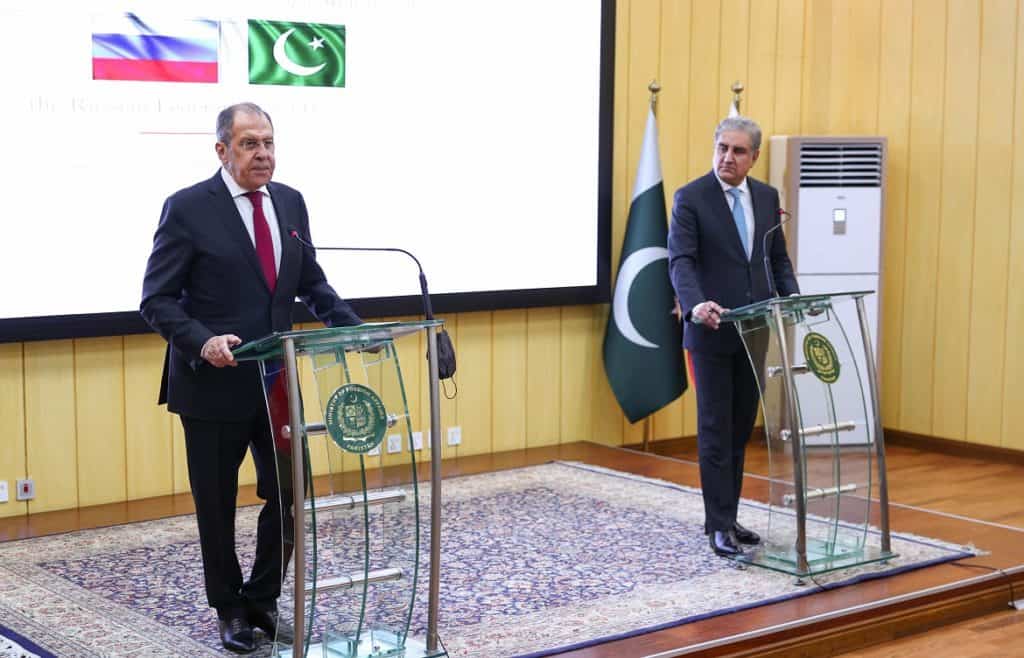By Sumaira Manzoor
The recent visit of the Russian Foreign Minister Sergey Lavrov to Pakistan, in the first week of April, attracted the attention of the media around the world. The Russian foreign minister met with the country’s high-profile military and civilian leadership. Several new dimensions for economic and political collaboration were discussed.
 Before going into the details of this recent development, let us take a look at the past experiences in Russia-Pakistan relations. During the Cold War period the relations were not good and the Soviet Union was considered the biggest security threat to Pakistan, after India. There were many reasons behind the harsh relations between two countries. Most important was the Pakistan’s alignment with the Western bloc: Islamabad joined SEATO and CENTO, blocks whose fundamental purpose was the containment of the Soviet Union.
Before going into the details of this recent development, let us take a look at the past experiences in Russia-Pakistan relations. During the Cold War period the relations were not good and the Soviet Union was considered the biggest security threat to Pakistan, after India. There were many reasons behind the harsh relations between two countries. Most important was the Pakistan’s alignment with the Western bloc: Islamabad joined SEATO and CENTO, blocks whose fundamental purpose was the containment of the Soviet Union.
The second reason for disagreement was the India factor, especially during the period of the 1970s, when the strategic and military partnership was increasing between the Soviet Union and India.
Pakistan was part of the US-led proxy war against the Soviet Union in Afghanistan, which was also a cause for a bad relationship. After the disintegration of the Soviet Union in 1991, relations between the Russian Federation and Pakistan did not improve. There were many reasons behind it, but two of them are the most significant.
1) The close military and strategic collaboration between India and Russia
2) The Taliban in Afghanistan. The Taliban (former mujahideen) in the past fought against the Soviet Union, while Pakistan was one of those countries that recognized the Taliban government. This was enough for Moscownot to improve its relations with Islamabad.
The Russia-Pakistan relationship begins to change after 9/11. The period of normalization shows a different inclination in relation to the “war on terror”, with exchanges of military delegations between the two countries.
The most significant turning point for improving relations was the “Pivot Asia” and “Indo-Pacific” policies of the United States.
Let’s analyze one by one the factors behind the emerging relations between Pakistan and Russia:
First, the US-India Nexus. The US foreign policy of the last three presidents is mainly based on containing China. To this end, the United States viewed India as one of its most important allies, and defense collaboration between the two countries has grown significantly over the past two decades.
India which was one of the founding members of the Non-Aligned Movement (NAM) during the Cold War period has now abandoned its policy of neutrality and is strongly oriented towards America: LEMOA agreement, BECA agreement and QUAD partnership – all of which reflect this inclination towards the United States. The supplier of military equipment from Russia to India has shrunk significantly. As a result, Russia is looking for alternatives: India, which used to be the main obstacle to Russia-Pakistan relations, has now shifted its focus westward. All of this contributed to the improvement and growth of the partnership between Russia and Pakistan. So we can say that the India-US nexus offers opportunities to improve relations between Moscow and Islamabad.
The second main reason behind this thriving collaboration is the change in regional geopolitical dynamics. The United States also viewed Russia as a major security threat when it announced its containment of Chinese policy. The United States wants to build a bloc of like-minded states in this region in the form of QUAD and QUAD PLUS, dividing the region into two large groups: states that stand alongside the United States, and that consider Russia and the China as a major security threat; and states that do not view these countries as a threat, but rather as a major boost to their economy. Pakistan falls into the second category, and in this way Pakistan and Russia found themselves in the same group.
Third reason is the China factor. Some scholars believe that China is a bridge between Russia and Pakistan. We can take the example of the Shanghai Cooperation Organization (SCO) in this regard, where dialogue between these countries is present.
The fourth reason is the geo-economy of the region. The growing economic partnership between Pakistan and China in the form of CPEC and the shift of India’s focus westward create the conditions for greater collaboration between Russia and Pakistan. Foreign direct investment (FDI) in Pakistan can be increased by strengthening economic relations with Russia. Pakistan is also encouraging Russian steps for an economic partnership, such as the proposed construction of a 100km LNG gas pipeline from Karachi to Lahore, worth $ 20 billion in cooperation with Russia.
If we look from the Russia context, Pakistan can be its main market, because the West is becoming a difficult destination, so Russians are looking for different options available, and Pakistan is one of them.
The last main reason is “counter-terrorism”, on which a great collaboration between Russia and Pakistan has developed. Joint military exercises in the fight against terrorism have been held annually since 2016, and the two countries share their experiences in the fight against terrorism. Counter-terrorism is therefore another important binding element for both countries.
What could be the potential benefits and challenges for Pakistan from this growing partnership?
There are three main areas that Pakistan is benefiting from or can benefit from, namely political, economic and security benefits.
Politically speaking, the growing partnership with Russia can provide Pakistan with important support from the major powers of the UN Security Council on various sensitive issues such as Kashmir. The isolation Pakistan has faced from Western and Indian lobbies within the United Nations will be reduced. Russia will join China in supporting Pakistan globally and regionally.
From an economic point of view, Pakistan is implementing major changes in its foreign policy to pursue geostrategic interests to geoeconomic interests, which cannot be achieved without the support of the great powers. The Western world is more inclined to India, so China and Russia are the best options available for Pakistan. While there is still no significant trade between Russia and Pakistan, there is great potential for it, and some scholars believe that the CPEC can be extended to Russia. Also, Pakistan is an energy-scarce country and Russia may be the best option available to meet its energy demands by importing gas. Against this backdrop, a $ 10 billion memorandum of understanding was signed a few years ago.
In terms of security, the US blocked military aid to Pakistan in 2017. So Islamabad now needs to get support from alternative powers, and Russia is willing to provide important defense help to Pakistan to counter terrorism.
Despite all the potential benefits of the growing partnership between Pakistan and Russia, there are also challenges facing Pakistan.
Military collaboration between Russia and India is still present, which can pose a threat to Pakistan’s national security and can be a serious source of friction with Russia for the future.
The second limiting factor is the country’s economic disparity. Some scholars argue that Russia’s involvement with Pakistan is the result of US policies towards this region, rather than the development of bilateral cooperation. Pakistan can directly attract Russian investment to stimulate its economy, but first there is a desperate need to improve the country’s economic conditions.
The uncertain future of Afghanistan is another major challenge for Pakistan-Russia relations. If the peace process in Afghanistan fails, unrest will begin in Afghanistan, with the possibility of a new wave of terrorism in the region. It can be a big divergence for both countries, if we look at the history.
Finally, the last major challenge is the historical distrust between the two countries, which will take some time to overcome.
Simply put, while we may be optimistic that Russia-Pakistan relations will improve, at the same time we shouldn’t be too optimistic. With history in mind, the growing partnership between Pakistan and Russia may be temporary, so Islamabad shouldn’t bet too much. on relations with Moscow. Pakistan should focus on its national interests.
Author: Sumaira Manzoor – M.phil Scholar ( Political Science) Bahawalpur, Pakistan.
(The views expressed in this article belong only to the author and do not necessarily reflect the editorial policy or views of World Geostrategic Insights).







